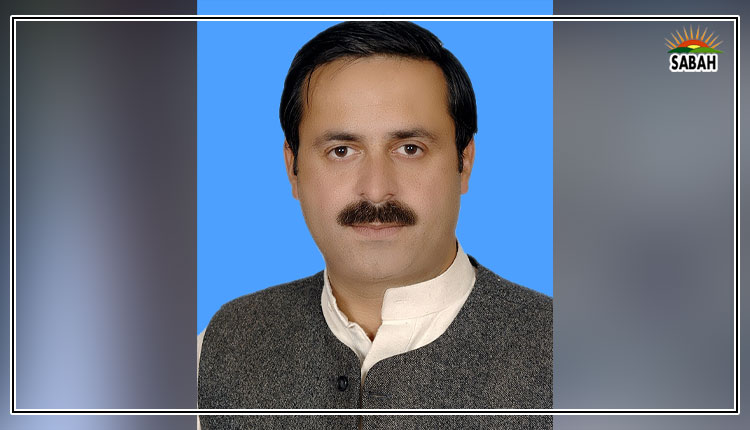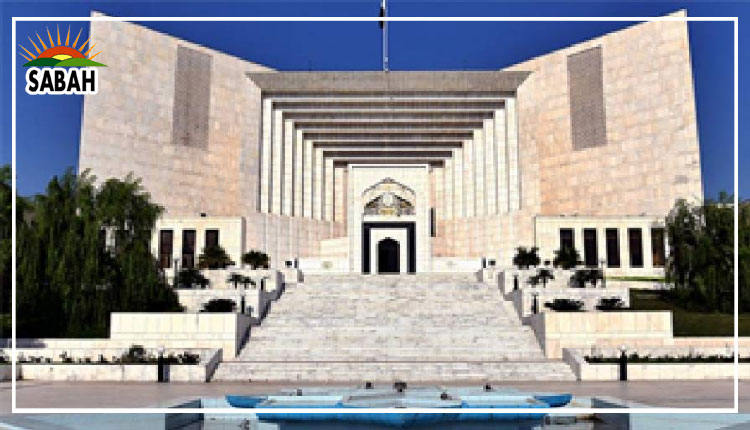SC issues notices to govt in connection with Imran Khan’s petition challenging recent amendments to the NAB ordinance
ISLAMABAD, July 29 (SABAH): The Supreme Court of Pakistan on Friday issued notices to the government in connection with
Pakistan Tehreek-e-Insaf (PTI) Chairman and former prime minister Imran Khan’s petition challenging the recent amendments to the NAB ordinance, with a judge observing that it is parliament that has the authority to change the Constitution.
A three-member bench comprising Chief Justice of Pakistan (CJP) Justice Umar Ata Bandial, Justice Ijazul Ahsan and Justice Syed Mansoor Ali Shah, heard the petition.
The court asked Imran’s lawyer Khawaja Haris Ahmed to highlight which NAB amendments were contrary to the Constitution and the fundamental rights of the people, with Justice Syed Mansoor Ali Shah remarking that the court could only exercise its authority over matters of parliament when they were unconstitutional.
At the outset of the hearing, Additional Attorney General Aamir Rehman said that he would assist the court on the matter, while the chief justice remarked that the court would only hear the petitioner’s arguments today.
He remarked that he had been reading Imran’s petition since last night, instructing Haris to present his arguments “in detail” on the how the amendment was contradictory to the Constitution and which fundamental rights did it violate.
The CJP also inquired about the amendments that affected NAB laws and cases.
However, Justice Shah pointed out that a similar petition had been filed in the Islamabad High Court (IHC) as well and suggested that the court should first wait for IHC’s “wisdom on the matter” before issuing a verdict.
In response, the PTI counsel said the NAB amendments do not concern just a single court, but the entire country.
Khawaja Haris said that both Islam and the Constitution stress accountability. “Independence of the judiciary and accountability of public officials are fundamental components of the Constitution,” he said, arguing that after the amendments, public officials had “exceeded” the concept of accountability.
Here, the chief justice remarked that further clarity was required on challenging the NAB amendments. “Khawaja sahab, it would be better if you prepare a brief chart on your requests,” he suggested.
The CJP said that the lawyer was referring to the Islamic provisions of the Constitution. “Having a check and balance is extremely important for democracy. Corruption occurs when you do something illegal and benefit from it,” he remarked, adding that doing so would be an abuse of power and a loss for the treasury.
“If a dam is being built somewhere and a lobby opposes it, then it will be opposition towards a national asset,” he stated, further highlighting that accountability was important to run a democracy and government.
Meanwhile, Justice Shah asked whether the court could restore the amended NAB law.
‘Parliament has authority to change the Constitution’
During the hearing today, Justice Shah highlighted that Imran’s petition had stated that the NAB amendments were contradictory to parliamentary democracy and the basic structure of the Constitution.
“You tell me which amendment is against the Constitution,” he asked. “Your job is to tell us which amendment is against the fundamental rights and the Constitution.”
The judge asked Haris to also highlight if the amendments were benefitting some specific accused people.
“Do you want the court to ask Parliament to improve the law?” he further inquired.
Haris said that his client wanted the court to declare amendments conflicting with the Constitution null and void.
Here, Justice Shah wondered whether the lawyer’s arguments about a law being against parliamentary democracy were sufficient for it to be annulled.
The judge said that the Constitution didn’t have a “basic structure” and several amendments were contradictory to it.
“The Parliament has the authority to change the entire Constitution,” he remarked, adding that the court has recognised the Constitution’s basic structure in the constitutional amendment case.
Replying to the judges’ questions, Khawaja Haris said that there were several amendments that were “contradictory” to the Constitution and gave the example of free education.
“Can the right of a free education be abolished by a constitutional amendment? If the parliament abolishes the death penalty, can it not be challenged?”
Here, Justice Shah said that if parliament were to abolish the death penalty, “how will we be able to restore it?”
The PTI lawyer replied that if that happened, it would first be challenged in the Shariat court.
At one point during the hearing, Chief Justice of Pakistan Umar Ata Bandial said that the judiciary’s independence was “essential to maintain balance in the society”. “Article 4 of the Constitution has never been discussed in detail but it is very important,” he said, adding that fundamental rights can be suspended but not Article 4. The law states that the right of individuals should be dealt with in accordance with the law.
Article 4 involves the inalienable right of individuals to be dealt with in accordance with law.
Justice Bandial also stated that if PTI’s emphasis was on Islam, “why don’t you challenge the NAB amendment in the Shariat court then?”
To this, Haris said that Islamic provisions referred to in the petition were enshrined in the Constitution. Continuing his arguments, he said that there were some NAB amendments that were “very critical”.
“Imran Khan has demanded all these amendments to be annulled in his petition,” he observed.
Subsequently, Justice Ijazul Ahsan instructed the lawyer to highlight all such amendments.
Haris said that one such amendment was that the person who makes the plea bargain could not become the witness.
“You are saying that many NAB amendments have made it difficult to prove the crime,” the CJP observed.
Khawaja Haris continued that under the amendments, relief was subject to the decision on an application. Here, the CJP asked the lawyer to inform the court if there was an “emergency regarding the relief”. “Also tell us how pending cases would be affected by the amendment.”
The PTI counsel replied that he was not asking for an injunction, but that relief under the amendments should be made conditional.
Subsequently, the court issued notices to the government on the plea under the amendments and adjourned the hearing till August 5.
In his petition, the ex-premier Imran Khan named the Federation of Pakistan through its secretary Law and Justice Division and the NAB through its chairman as respondents in the case.
Imran requested the court to adjudicate upon questions of “great public importance” with reference to the enforcement of fundamental rights of citizens under articles 9 (security of a person), 14 (inviolability of dignity of a man, etc), 19A (right to information), 24 (protection of property rights) and 25 (equality of citizens) of the Constitution.
Most of the amendments brought into NAB, he argued, were person-specific. “As such, it is just and fair to protect the constitutional and fundamental rights of the citizens of Pakistan.”
The petition added that the amendment hands over the president’s right to appoint the body’s chairman to the government which will “maneuver by the bulk of the holders of public office to assume control over and influence the impartiality of the NAB chairman.”
“The removal of hurdles in the normal time-tested and universally adopted methods of proving ‘white collar crimes’, reducing the efficacy, transparency, and fairness of these laws coupled with a free and independent judiciary, and freedom of the investigators and the prosecutors from the influence and interference of those very chosen representatives whose alleged corruption and corrupt practices they are tasked to investigate and prosecute.”
He cautioned that making accountability law “weak and ineffectual” was a severe breach of the Constitution and underscored that the people of Pakistan had the right to hold their elected representatives accountable for their fiduciary actions.
The NAB (Second Amendment) Bill 2021 states that NAB’s deputy chairman, to be appointed by the federal government, would become the acting chairman of the bureau following the completion of the tenure of the chairman.
The bill has also reduced the four-year term of the NAB chairman and the bureau’s prosecutor general to three years. After approval of the law, NAB will not be able to act on federal, provincial or local tax matters. Moreover, the regulatory bodies functioning in the country have also been placed out of NAB’s domain.
It says that “all pending inquiries, investigations, trials or proceedings under this ordinance, relating to persons or transactions … shall stand transferred to the concerned authorities, departments and courts under the respective laws.”
It has also set a three-year term for the judges of the accountability courts. It will also make it binding upon the courts to decide a case within one year. Under the proposed law, it has been made binding upon NAB to ensure the availability of evidence against an accused prior to his or her arrest.
According to one of the key amendments, the act “shall be deemed to have taken effect on and from the commencement of the National Accountability Ordinance 1999”.











